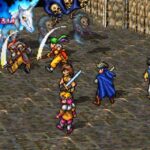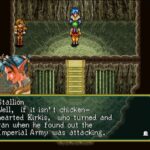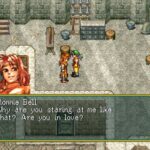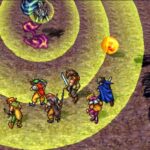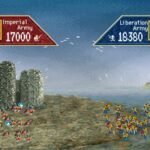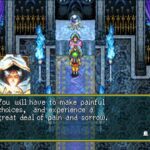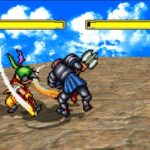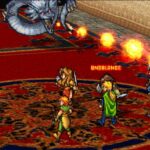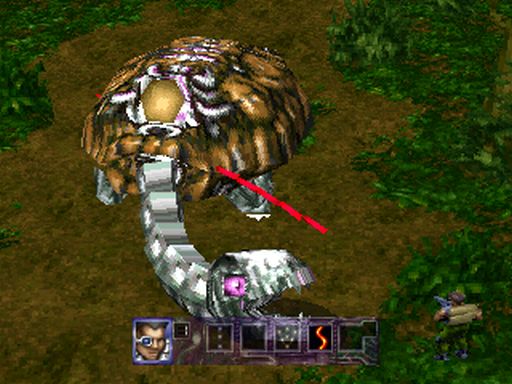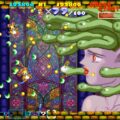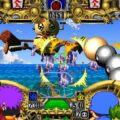Developer: KCET Publisher: Konami Release: 12/28/96 Genre: RPG
When it comes to RPGs Konami was not the first name most would point to, at least in the mid-90s. While they had built up a steady reputation for creating some of the best action platformers around they tended to stay away from role playing games in the west. Overseas Konami had a long association with the genre dating back to the Famicom. Dragon Scroll, Madara, and Esper Dream were some of the titles we missed out on. In 1995 Konami created Suikoden, one of the closest any new series has ever came to reaching the same height as Dragon Quest and Final Fantasy.
And to think we almost missed out on this great series in the US! Loosely based on the Chinese novel Shui Hu Zuan, Suikoden would arrive before Final Fantasy 7 would create a large market for RPGs in the US. Like many my initial exposure came from the many frequent import previews in Diehard Gamefan. Where everyone else only gave it a brief caption they did multiple deep dives on what made it unique. I would not be surprised if their coverage helped convince Konami to take a chance on the game in 1996. It definitely paid off as Suikoden sold well enough that we received nearly every further release in the series.
You are Tir McDohl, son of one of the Scarlet Moon Empire’s five great generals. You live a life of luxury, with all of your friends living together in the family mansion as well as a creepy manservant. The Empire has been good to you your whole life but its benevolent facade fades once you officially begin to serve the Emperor. The stories of a change in Emperor Barbarosa prove true and have dire consequences for the Empire. Through a series of events you eventually become leader of the Liberation Army and set out to save the country.
There are many aspects of Suikoden’s story that make it truly unique. No Suikoden game has ever spanned the entire world; each game focuses on a regional conflict. While small in scope it is no less epic, with many a tear jerking moment. In each title the protagonist comes into possession of one of the 27 True Runes, the sources of all magic in the world. While it sounds great on paper it ruins their lives as well. You are not out to save the world. For these characters overthrowing the evil emperor is equivalent to saving their world and is no less important. This was a nice change of pace from the usual world spanning, god killing fare of the genre.
Perhaps the element that gives the series its notoriety is its large cast. Where most RPGs settle on a party of 6-10 Suikoden dwarfs them all with 108 unique characters. These are your generals and the more you enlist the larger your army grows. Once you have your fortress the more characters you recruit the larger it grows. Not everyone is a front line fighter but their services are crucial. You will appreciate the elevator guy once your base reaches five floors + a basement. Eventually you will house all of the different shops in your castle, negating the need to teleport all around the world. Some characters offer lore, customization options, and even allow you to listen to the fantastic soundtrack. Obviously everyone does not get character development but it isn’t needed to make them all feel unique.
Half of the fun in any Suikoden game is in determining how to recruit certain characters. Usually half of the cast will join automatically at important story junctions. It’s the rest that are a mystery. There is no greater joy than encountering a unique sprite and determining what is needed to get them to join your party. You will want to recruit everyone just to see what abilities they bring to the table as pairing certain characters grants powerful unite skills in battle.
Even in its turn based battles Suikoden is innovative. Every character has a set range (long, medium, short) which affects who they can attack in battle. Enemies come in groups of 6-9 arranged in back and front rows. Your party arrangement is key as it is possible to make characters useless in battle due to positioning. The same also applies to enemies as well. Random battles are brisk despite the large numbers for a few reasons. Once you entered all commands both parties attack at the same time based on speed. I really wish more games used this system as it avoids tedium. The game also has a balanced encounter rate and outside of leveling more party members you will almost never have to grind for progress.
In addition to its random battles there are also one on one duels and strategic war battles. Once you engage one of the empire’s generals all of those characters you’ve recruited come into play. Everyone has a role and the larger your army the more options available. These battles follow a rock, paper scissors format where charge beats bow, magic beats charge, and bows beat magic. You are left to guess what the enemy will do unless you have someone who can scout ahead. Duels also follow this format but you can guess based on what the enemy is saying.
With all of its features its surprising that Suikoden is short by RPG standards. Most will scrape by in twenty hours or so thanks to its well-balanced nature. Leveling is fast making it is easy to bring newer characters up to speed. Since everyone has one weapon that you upgrade continuously you save money to spend on armor. You can max out your cash within the first few hours by cheesing the Chinchirorin minigame. The game is not difficult and finding everyone will certainly add a few hours to that time. It is worth it as there is an extra ending and you can import your save data in the sequel.
In Closing
I could go on forever singing the game’s praises but you get the point. A great story, a beyond amazing Celtic soundtrack, and innovative gameplay make this a real treat. Suikoden is a fantastic game and deserving of classic status.


